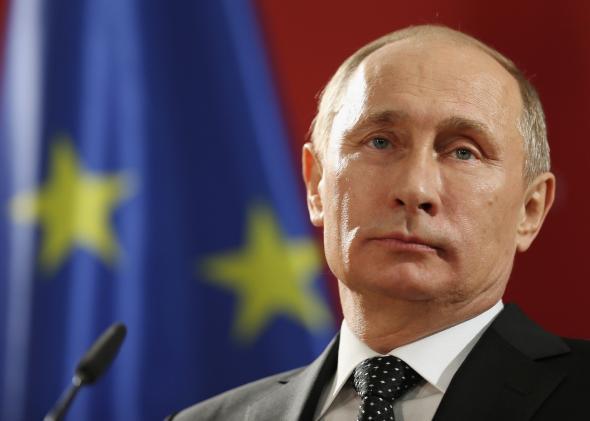Recently, there has been much media ado about how nervous Poland and the Baltic states are about Russia. The Russian Foreign Ministry has said that it may need to protect Russian speakers in the Baltics against “xenophobia”—similar language to that used in the early days of the Ukraine crisis. According to some press reports, Russian President Vladimir Putin also warned Ukrainian President Petro Poroshenko in a private meeting that his troops could take not only Kiev but the capitals of Latvia, Lithuania, Estonia, Poland, and Romania “within two days” if he wanted.
So, those countries—all members of NATO—are worried, and perhaps rightly so. But they aren’t the only ones.
Georgia went through its own invasion by Russian forces back in 2008. Chuck Hagel recently visited the Caucasian republic—the first time that a U.S. secretary of defense had done so in more than a decade—as a gesture to demonstrate the United States’ commitment to its longtime ally. The country also got a shout-out in President Obama’s speech in Estonia on Sept. 3.
Unlike Estonia but like Ukraine, Georgia is not a member of NATO. And unlike Ukraine, Georgia has been consistent in expressing its desire to join NATO. Georgians, then, were unpleasantly surprised in late March when Obama said that neither Ukraine nor Georgia is “currently on a path to NATO membership.” This was not the first and will likely not be the last time that the United States and other NATO countries have reversed their position on Georgia joining NATO. Despite the country’s commitment to the alliance, including participation in the war in Afghanistan, the reality is that NATO is unlikely to offer membership to a country on Russia’s border, one that’s under constant (sometimes realized) threat of attack from Russia.
Georgia, generally speaking, is supportive of Ukraine: The streets of Tbilisi are adorned with blue-and-yellow flags. There was also a late-August rally in support of Ukraine, and calls for a more forceful response by the Georgian government and international community. But the government has been careful to stress that the two situations are not parallel: In June, Georgian Prime Minister Irakli Garibashvili went on BBC World News to stress the difference between the case of Crimea and that of Georgia’s separatist regions of South Ossetia and Abkhazia, insisting that Russia had no plans to annex either.
Farther east, and farther removed from NATO, there’s also reason to worry. In late August, Putin called into question the legitimacy of Kazakhstan, which also has a large ethnic Russian minority, saying, in an address to young people in Russia, that there had never been such a state, and its president, Nursultan Nazarbayev, had created the country.
“I am confident,” Putin said, “that a majority of [Kazakhstan’s] population supports development of close ties with Russia. Nazarbayev is a prudent leader, perhaps the most prudent in the post-Soviet space. He would never act against the will of his own people.” (Nazarbayev, for his part, responded that the people of Kazakhstan treasure their independence above all else, and will never surrender it to anyone.)
Meanwhile, Russia has been tightening its control over Kyrgyzstan. Moscow recently wrote off half a billion dollars of the country’s debt, and Russia’s state-run oil firms have been investing heavily in the country. The Kyrgyz government also closed a U.S. airbase outside the capital, Bishkek—the last foothold of the American military in the region.
It’s important to note that Kyrgyzstan does not resent its political or economic dependence on Russia, and most Kyrgyz people support Russian presence and influence. And Russia cannot take the Kazakh capital of Astana in two days, in no small part because China is also interested in wielding influence over the country. That leaves Georgia looking anxiously, hopefully to NATO, and Eastern European countries in NATO looking nervously toward each other: On Friday, Poland and Lithuania will join Ukraine in the creation of a joint military force to establish a unit that could be used for peacekeeping operations—or as a potential NATO base.
